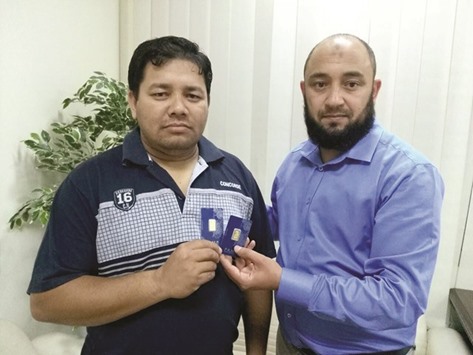Having completed his high school and burdened with the financial responsibility of an impoverished family, Nepalese expatriate Prakash Chandra Acharya landed in Doha in 2005. He came here to work as a labourer in Nasser Al Al-Ali Enterprises. Despite being a bright student, Acharya’s family couldn’t support his further education. He was the eldest son; one who has to support the family.
He worked as a labourer in Nasser Al Al-Ali Enterprises for two years before his employer promoted him as a trade worker. Soon after, he became a site supervisor. A quick learner, Acharya also started giving training of scaffolding, steel fixing, carpentry, masonry and electrical works to the newcomers.
Over time, he became an expert in all of the above categories. He could develop maps of buildings which senior engineers would readily approve. Now, he was earning three times more than his initial salary. The rise of Acharya is a testament to the large number of successful workers here in Qatar.
Many Nepalese youths face financial difficulties back home. They have to struggle hard to get two square meals a day. Qatar is a place where some of those youngsters unleash their potential.
Acharya, who hails from Kathmandu, the capital city of the Himalayan nation, was unmarried when he first came here. He was here only for two years. “I didn’t think that I could stay in Qatar for a decade,” Acharya says, “I only expected to stay for two years and go back home.”
Acharya is fond of engineering. “Back then I thought I would use my savings to do an engineering course in Kathmandu. But, now I feel I can become an engineer at my workstation.”
Time is the greatest healer. When he came to Qatar because of his family’s poverty, he felt star-crossed. Now, in his own words, he is the luckiest man on earth. “Every time I see new workers I remember my early days.”
I give training to newcomers and reckon who I was once upon a time. “Nepal sends labourers to Qatar, and the latter sends back skilled labourers including the remittances.” In the company where Acharya works, there are 1,200 Nepalese employees. He expects, in a short run, all of those would become skilled. “I am a very simple person, I didn’t have to earn a lot of money, yet Qatar encouraged me to aspire for more,” Acharya says. Many of his colleagues now call him ‘engineer’.
In Kathmandu, Acharya had seen big buildings that were under construction. “I had a genuine question in my heart on how they were being built.” This old habit has not died yet, every time he comes across a new building in Doha or somewhere else, he asks the same question.
In Acharya’s company, Nepalese workers have come in from different parts of the Himalayan nation. “Here we work with unity and co-operation.” This sharing and caring among our brethren’s is, according to Acharya, a lesson to ever-wrangling politicos of his homeland.
Acharya has a basic duty of eight hours, and he loves doing over-time. “If I return to my country, I can give back something.” “I am not worried about my life because I have the skills. I can take contracts of buildings if I return to Nepal.”
His sponsor Nasser Ali Al-Ali says, “It is our pride that one of my employees has become a site supervisor.” Acharya was on the Nasser’s first batch of workers. “The company’s success depends on workers’ hard work,” Nasser says, adding: “In the case of Acharya, he has made both himself and the company successful.”
Acharya was awarded with gold coins weighing 15g three times for his best performance. He was also awarded QR15,000 for his successful completion of 10 years at Nasser’s. “From this sum, I gave a part of it to my brother’s treatment who is sick for a long time.” I have bought a plot in city. I have an eight-year-old daughter who studies in a reputable school and my family now invests in agriculture. “The gold coins which I got from my company I gifted them to my wife,” he reveals
Acharya thanks his sponsor and boss for providing him with a new life and the skills that made him self-sufficient.

Acharya is awarded gold coins by General Manager Moncef Habli.
